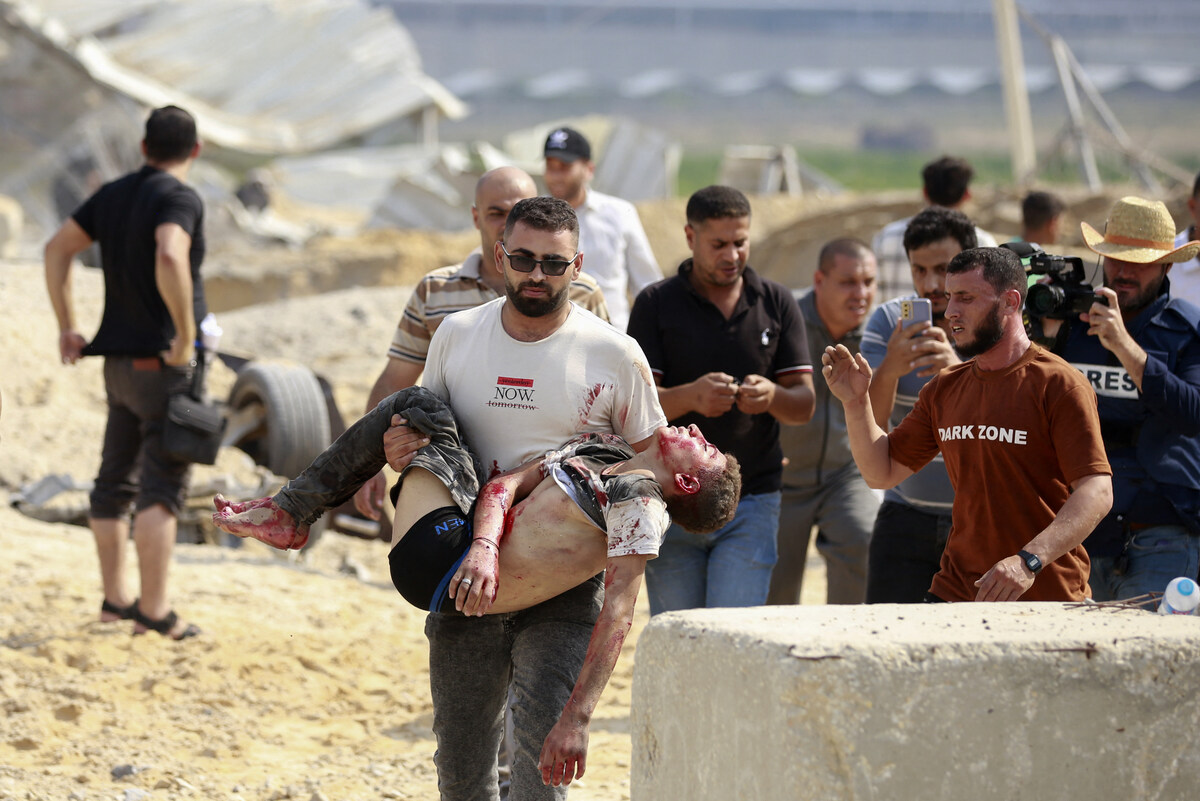UNICEF says 120 incubator babies at risk as Israel cuts Gaza fuel
The lives of at least 120 newborn babies in incubators in war-torn Gaza’s hospitals are at risk as fuel runs out in the besieged enclave, the UN children’s agency warned Sunday. More than 1,750 children have already been killed by Israeli strikes launched against the Gaza Strip in retaliation for the October 7 Hamas attacks, […]

EDITORS NOTE: Graphic content / A man carries away a Palestinian killed in an Israeli airstrike at the Erez crossing between Israel and the northern Gaza Strip, on October 7, 2023. – Palestinian militants have begun a “war” against Israel which they infiltrated by air, sea and land from the blockaded Gaza Strip, Israeli officials said, a major escalation in the Israeli-Palestinian conflict. (Photo by BASHAR TALEB / AFP)
The lives of at least 120 newborn babies in incubators in war-torn Gaza’s hospitals are at risk as fuel runs out in the besieged enclave, the UN children’s agency warned Sunday.
More than 1,750 children have already been killed by Israeli strikes launched against the Gaza Strip in retaliation for the October 7 Hamas attacks, according to the Palestinian territory’s health ministry.
Hospitals face a dire lack of medicines, fuel and water not only for the thousands wounded in more than two weeks of the war between Gaza militants and Israel but also for routine patients.
“We have currently 120 neonates who are in incubators, out of which we have 70 neonates with mechanical ventilation, and of course, this is where we are extremely concerned,” said UNICEF spokesman Jonathan Crickx.
- Failed escape attempt: ‘Niger’s deposed president with family, doing well‘
- Gaza war: 100,000 pro-Palestinian protesters march in London – Police
Power is one of the main worries for the seven specialist wards across Gaza treating premature babies to help with breathing and provide critical support, for example when their organs are not developed enough.
Israel ordered a complete blockade of the territory after the Hamas attacks, in which the Islamist group killed 1,400 people, mostly civilians, according to Israeli officials.
Amid widespread electricity cuts, the World Health Organization warned on Thursday that hospitals had already run out of fuel for generators.
The WHO said that about 1,000 people needing dialysis will also be at risk if the generators stop.
Twenty aid trucks crossed from Egypt into Gaza on Saturday but there was no fuel in the consignment.
Israel fears that fuel could help Hamas, although the limited supplies still in Gaza were being diverted to keep the generators for medical equipment running.
“If they (babies) are put in mechanical ventilation incubators, by definition, if you cut the electricity, we are worried about their lives,” the UNICEF spokesman told AFP.
Gaza’s health ministry said on Saturday that 130 premature babies were in danger of dying due to the lack of fuel.
Around 160 women give birth each day in Gaza, according to the UN Population Fund, which estimates there are 50,000 pregnant women across the territory of 2.4 million people.
While Israel says its strikes are aimed at Hamas, which perpetrated the worst attack against Israel since its creation in 1948, children make up a huge proportion of the 4,385 dead reported by the Hamas-run health ministry.
Whole families, including pregnant women, have been killed in strikes and each day parents can be seen in devastated streets carrying the bodies of infants in white shrouds.
Doctors at Najjar Hospital in Rafah spoke on Thursday of how they had tried in vain to save an unborn infant from a woman killed in an air strike on her family’s home.
Hours earlier, eight children were killed as they slept in a house in Khan Younis in southern Gaza.
